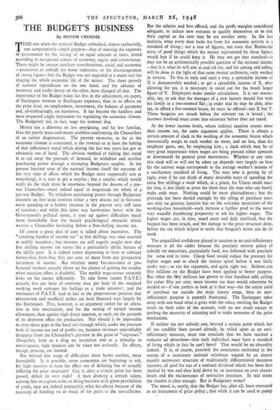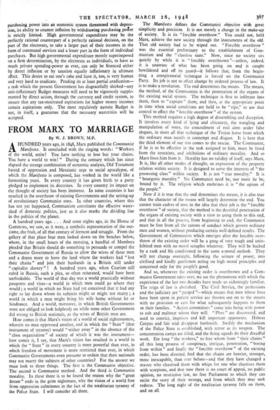THE BUDGET'S BUSINESS
By HONOR CROOME
TME was when the national Budget embodied, almost exclusively, one comparatively simple purpose—that of meeting the expenses of government by the raising of an equal amount in taxes, levied according to recognised canons of economy, equity and convenience. There might be certain auxiliary considerations, social and economic —protection or subsidy for home industries, or the discouragement of strong liquor—but the Budget was not regarded as a major tool for shaping the whole economic life of the nation. The sheer growth of national expenditure on the one hand, and the advance of monetary and credit theory on the other, have changed all that. The importance of the Budget today lies less in the adjustment, on paper, of Exchequer revenue to Exchequer expenses, than in its effects on the price level, on employment, investment, the balance of payments and, all-embracingly, on incentives. It has become the handiest and most respected single instrument for regulating the economic climate. The Budgetary tail, in fact, wags the national dog.
Herein lies a dilemma no less perplexing, and far less familiar, than the purely ways-and-means problem confronting the Chancellors of an earlier dispensation. The present necessity, so far as the economic climate is concerned, is the reversal or at least the halting of that inflationary trend which during the last two years has got so obviously out of hand. The obvious method of halting that trend is to cut away the pressure of demand, to withdraw and sterilise purchasing power through a thumping Budgetary surplus. In the present buoyant state of the national income (itself the outcome of the very state of affairs which the Budget must supposedly aim at remedying), it is easy to get a surplus ; but a surplus which would really do the trick must be enormous beyond the dreams of a pre- war Chancellor—must indeed equal in magnitude the whole of a pre-war Budget. To withdraw purchasing power through Budgetary channels on this scale involves either a very drastic cut in Govern- ment spending or a further increase in the present very stiff rates of taxation ; and while this latter way harmonises better with the Government's Political tastes, it runs up against difficulties much more formidable than the mainly psychological obstacles which worries a Chancellor hesitating before a five-shilling income tax.
Of course a great deal of cant is talked about incentives. The " crushing burden of income tax" at five shillings was once asserted to nullify incentive ; but incomes are still eagerly sought now that five shilling income tax seems like a particularly idyllic feature of the idyllic past. It is indeed rather depressing to have to subtract twenty-five, forty-five, fifty per cent, or more from any prospective increment of income. But whether many business-men or pro- fessional workers actually throw up the chance of gaining the residue when occasion offers is doubtful. The weekly wage-earner certainly looks on the matter differently. To take home (under P.A.Y.E.) actually less per hour of overtime than per hour of the standard working week outrages his feelings as a trade unionist ; and the mechanics of P.A.Y.E. lead in fact to the preposterous position that absenteeism and unofficial strikes are both financed very largely by the Exchequer. This, however, is an argument rather for an altera- tion in that mechanism, and for the raising of earned income allowances, than against high direct taxation, as such, on the grounds of its deterrent effect on production. Nor should it be impossible to close those gaps in the fiscal net through which, under the pressure both of income tax and of profits tax, business revenues unjustifiably disappear from the Chancellor's purview in the guise of "expenses." Altogether, both as a drag on incentives and as a stimulus to extravagance, high taxation can be taken too seriously. Its effects, though genuine, are limited.
But beyond this range of difficulties there looms another, more formidable. Is it possible, some economists are beginning to ask, for high taxation to have the effect not of deflating but of actually inflating the price structure? Can it, after a certain point has been passed, defeat its own ends? A man drawing a certain salary, earning fees on a given scale, or doing business with given possibilities of profit, may not indeed perceptibly relax his efforts because of the necessity of handing on so much of his gains to the tax-collector.
But the salaries and fees offered, and the profit margins considered adequate, to induce new entrants to qualify themselves or to risk their capital as the case may be are another story. In the last analysis, what every man looks for from his economic activity is a standard of living ; not a row of figures, not even that Barmecide array of good things which the money represented by those figures would buy if he could keep it. He may not get that standard—it may not be an arithmetically possible quotient of the national income —but it is what he will aim at and ask for, and his aiming and asking will be done in the light of that same mental arithmetic, only worked in reverse. To live in such and such a way, a spendable income of X is demonstrably needed ; to get a spendable income of X, after allowing for tax, it is necessary to stand out for the much larger figure of Y. Employers make similar calculations. It is not reason- able, say, to ask that the manager of a new factory should live with his family in a two-roomed flat ; in order that he may be able, after tax, to afford a five-roomed house, he must be offered—not X but Y. These bargains are struck before the relevant tax is levied ; the incomes involved must come into existence before they are taxed.
At the lower income levels, where indirect taxation counts more than income tax, the same argument applies. There is always a certain amount of slack in the working of the economic forces which theoretically assign to each worker no more, and no less, than his employer gains, net, by employing him ; a slack which may be of very great importance when wages are being pressed either upwards or downwards by general price movements. Whether at any time this slack will or will not be taken up depends very largely on how far the current wage corresponds to the average worker's notions of a satisfactory standard of living. The man who is getting by all right, even if he can think of many desirable ways of spending the extra five shillings a week which, at a pinch, his Union could exact for him, is less likely to press for them than the man whq can barely make ends meet. Nothing could be more platitudinous ; but the platitude has been denied outright by the piling of purchase taxes not only on genuine luxuries but on the everyday necessities of the working-class household—each increase a further prod to the never very soundly slumbering propensity to ask for higher wages. The higher wages are, in time, taxed away and duly sterilised, but the bargain has been struck, and the damage to the price structure done, before the tax which helped to settle that bargain's terms can do its work.
The unqualified confidence placed in taxation as an anti-inflationary measure is all the odder because the precisely reverse policy of subsidy on necessities, particularly food, was followed with precisely the same end in view. Cheap food would reduce the pressure for higher wages and so check the vicious spiral before it was fairly under way ; so ran the argument, and quite right too. Seldom can fifty millions on the Budget have been applied to better purpose. But when the fifty millions has grown to four hundred odd, calling for either fifty per cent. more income tax than would otherwise be needed or—if one prefers to look at it that way—for the entire yield of purchase tax outside the truly luxury range, then its anti- inflationary purpose is patently frustrated. The Exchequer takes away with one hand what it gives with the other, swelling the Budget totals on both sides of the account, with no net result except to prolong the necessity of rationing and to make nonsense of the price mechanism.
If neither tax nor subsidy can, beyond a certain point which has all too credibly been passed already, be relied upon as an anti- inflationary measure, must one conclude that we have reached a reductio ad absurdum—that each individual must have a standard of living which in fact he can't have? That would be an absurdity indeed. It is, of course, precisely the conclusion enshrined in the notion of a sacrosanct national minimum topped by an almost equally sacrosanct structure of • traditionally differentiated incentive incomes, all paid for out of a national dividend which has been first slashed by war and then held down by an insistence on ever shorter hours and the maintenance of restrictive practices. In real terms the trouble is clear enough. But in Budgetary terms?
The moral is, surely, that the Budget has, after all, been overrated as an instrument of price policy ; that while it can be used to pump purchasing power into an economic system threatened with depres- sion, its ability to counter inflation by withdrawing purchasing potter is strictly limited. High governmental expenditure may be the perfectly rational counterpart of a perfectly rational decision, on the part of the electorate, to take a larger part of their incomes in the form of communal services and a lesser part in the form of individual purchases. But high governmental expenditure merely superimposed on a firm determination, by the electorate as individuals, to have as much private spending-power as ever, can only be financed either by direct inflation or by taxation equally inflationary in ultimate effect This desire to eat one's cake and have it, too, is very human and very hard to eradicate. Pending its at least partial eradication— a task which the present Government has disgracefully shirked—any anti-inflationary Budget measures will need to be vigorously supple- mented by direct action, through the currency and credit system, to ensure that any tax-motivated aspirations for higher money incomes remain aspirations only. The most repulsively austere Budget is not, in itself, a guarantee that the necessary austerities will be accepted.



































 Previous page
Previous page